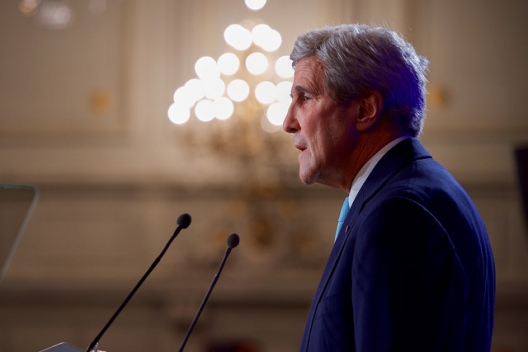 Let me underscore: The United States of America will support its friends and its allies on both sides of the channel as you work through the tough issues ahead, but we will not be shy about where our interests lie. We need the strongest possible EU, the strongest possible UK, and a highly integrated, collaborative relationship between them….
Let me underscore: The United States of America will support its friends and its allies on both sides of the channel as you work through the tough issues ahead, but we will not be shy about where our interests lie. We need the strongest possible EU, the strongest possible UK, and a highly integrated, collaborative relationship between them….
The transatlantic partnership is not a trophy from the past that we can put on a shelf and just look at and admire – it’s a living, breathing, multifaceted enterprise. And we have to renew it with each generation and refuel it every day with our energy, our ideas, our resources, and – above all – our collective determination and will.
I say that because it’s true; and I say it because our partnership is central to the security of all of our countries, particularly in the changed threat environment that we face today.
In the United States, we will never forget that Article 5 of the North Atlantic Treaty was triggered for the first time after 9/11. And I can assure you – that whatever you may have read in recent times – the United States of America will never fail to meet its own Article 5 obligations should any NATO member come under attack.
Last July, at the alliance summit in Warsaw, our leaders gave tangible backing to that principle by agreeing to enhance NATO’s presence in the East and to move forward with the most substantial new deployment of allied capability in the region in the past quarter of a century. In addition, President Obama has requested from Congress 3.4 billion in new funding to help our allies improve their defense forces, modernize communications, strengthen command and control, and step up the number and the rigor of our joint exercises. Across the alliance, we welcome the efforts that many members are making to augment their contributions, and we urge all of those members to meet the standards that all agreed to set.
Now, nonetheless, I emphasize – and I want to emphasize this particularly in the wake of the news of the last few days – NATO is a defensive alliance. The Russian people, in particular, should know that despite what their leaders sometimes tell them, our alliance does not seek to weaken, to contain, or to divide their nation or any other nation. We want to work with Russia. We want to work with a Russia that is just as committed to solving common challenges. In fact, I have probably spent as much time with the Russian foreign minister as I have with any other foreign diplomat.
But the willingness of NATO and EU countries to search for common ground with Russia doesn’t relieve us of the obligation to stand our ground on behalf of freedom and international law, which is why we remain steadfast in our support for a stable, united, and democratic Ukraine. And Moscow should have no doubt on this point: we will stand our ground. Blatant aggression is not something that any of us are prepared to accept, and no place in the world should understand it better than Europe. So we have imposed sanctions and we are insisting on a diplomatic solution to the conflict in Donbas and the illegal annexation of Crimea – even as we encourage the government in Ukraine to stay the course and accelerate the pace of reform.
Now, obviously, Russia resents the sanctions, but no one should forget – they were not put in place gratuitously – they are in furtherance of the rule of law and long-established norms of international behavior. They are designed solely to encourage a return to peace, stability, and the recognition of legitimate sovereignty.
Now, we must also push back against attempts by anyone to undermine political, economic, and energy cohesion in the cooperation of the Euro-Atlantic region…
These are serious problems; no one can deny that. But the Euro-Atlantic partnership did not come together to coast along through the best of times; it was forged to address epic challenges that no one nation, no tiny group of nations, could deal with successfully on their own. And make no mistake; the need for our unity is as great as ever – and our resolute spirit must remain just as strong….
Today, in my eighth decade of life, when I look across the Atlantic from either direction, what I still see is a vast community – more than a billion free men and women – advocating and pushing each day on behalf of democracy, equal opportunity, freedom, freedom of speech, freedom of thought, freedom of religion, freedom to organize, environmental preservation, respect for the fundamental rights and dignity of every human being, and earnestly desiring – for themselves and for all – the blessings of peace. So I am not cynical about the future. I am confident.
Excerpts from remarks on the transatlantic relationship by Secretary of State John Kerry, October 4, 2016.
Image: Secretary of State John Kerry in Brussels, Oct. 4, 2016 (photo: Department of State)
